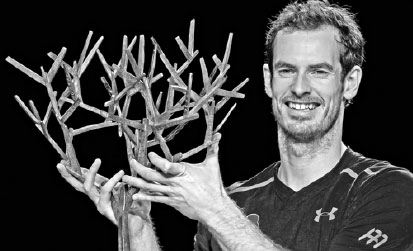Murray's fortitude is as strong as his forehand
By John Leicester (China Daily) Updated: 2016-11-10 06:54For each top athlete, there's a word.
For Usain Bolt, it would have to be speed. For soccer's Lionel Messi: balance. For swimmer Michael Phelps: buoyant.
But for the new king of men's tennis, Andy Murray, a quality both mental and physical springs to mind: fortitude.
Meanies would argue that Murray has taken over the No 1 ranking this week - the first Briton to reach the summit - only because the three players who were better than him for so long finally vacated it - the tennis equivalent of John, Paul and George giving Ringo a rare opportunity to sing.
And there is a modicum of truth in that.
Roger Federer, the 17-time major champion who this week dropped out of the top 10 for the first time since Oct 2002, long had the measure of Murray, beating him in three Grand Slam finals, but is now a largely spent force at age 35.
Rafael Nadal's creaky body is paying the bill for his brand of nitro-power tennis that won him 14 major titles and the top ranking for a total of 141 weeks to July 2014.
The 30-year-old hasn't won a major since then, or even made a semifinal, and has endured injuries to both wrists. But his career Grand Slam record against Murray is unequivocal: seven wins in nine encounters, with the last defeat way back at the 2010 Australian Open.
And the top dog Murray toppled, the now No 2-ranked Novak Djokovic, won five of his 12 major titles by beating the Scot in the final.
If Djokovic can regroup, rethink and remotivate himself with new targets after completing his career grand slam this year and then suffering a dip, leaving the door ajar for Murray, the Briton's reign as No 1 could be short.
The top ranking, then, doesn't change the fact that Murray is still "only," a word that seems uncharitable in the circumstances, the fourth-best player in what has been modern tennis' toughest era.
But Murray might well be the most stubborn, the era's paragon of perseverance. Being the fourth member of the Big Four for so long could have broken players with less heart. He first got to No 2 more than seven years ago and spent a total of 76 weeks there. That's a long time to be waiting in the wings.
But, in the end, Murray outlasted all comers.
He is the sailor who soldiered through storms that chased others back to harbor, the boxer repeatedly floored but never knocked out.
Murray used the beatings he suffered from Federer, Nadal and Djokovic - losing 20 of the 25 times he played them at the majors - as reasons to keep improving himself.
He could have cursed his luck, been led astray by the mirage that in any other decade, he'd have won more than two Wimbledon titles and the US Open by now.
But instead, Murray just worked even harder, took better care of himself and made sure that when the opportunity finally came, he was ready to seize it.
It would be tempting to delve into Murray's past for signposts that explain his ascent to the top.
One could argue that cutting his tennis teeth in inhospitable Scottish weather more suited to golf, rugby or soccer maybe toughened him up.
As kids, he and brother Jamie would hit a balloon back and forth over a rope hung from a radiator at home.
One could also fall into psycho-babble and hazard a guess that surviving the slaughter of 16 children and their teacher by a gunman at his Dunblane Primary School in 1996 helped teach Murray about deep emotional pain and how to rebound from it.
Or one could point to the teenaged Murray who badgered his parents to send him to a tennis academy in Spain as evidence that he's never lacked drive and the willingness to make sacrifices.
But more simply, the top ranking is reward for his journey, where Murray could have turned back and convinced himself that Mounts Federer, Nadal and Djokovic were simply too steep.
Instead, he kept climbing.
Not the most eloquent of speakers, at least not in public, one phrase of Murray's stands out, delivered after he lost to Federer in the 2012 Wimbledon final.
"I'm going to try this, and it's not going to be easy," Murray said, fighting back tears.
Specifically, he was talking about how difficult it was to deliver his loser's speech to the supportive Center Court crowd.
But that philosophy - "not easy" and "try" - is Murray in a nutshell.
And he wears it well.
The author is an international sports columnist for The Associated Press. Write to him at jleicester@ap.org
Associated Press
|
Andy Murray poses with the trophy after winning the Paris Masters on Sunday. Reuters |
- 'Cooperation is complementary'
- Worldwide manhunt nets 50th fugitive
- China-Japan meet seeks cooperation
- Agency ensuring natural gas supply
- Global manhunt sees China catch its 50th fugitive
- Call for 'Red Boat Spirit' a noble goal, official says
- China 'open to world' of foreign talent
- Free trade studies agreed on as Li meets with Canadian PM Trudeau
- Emojis on austerity rules from top anti-graft authority go viral
- Xi: All aboard internet express












